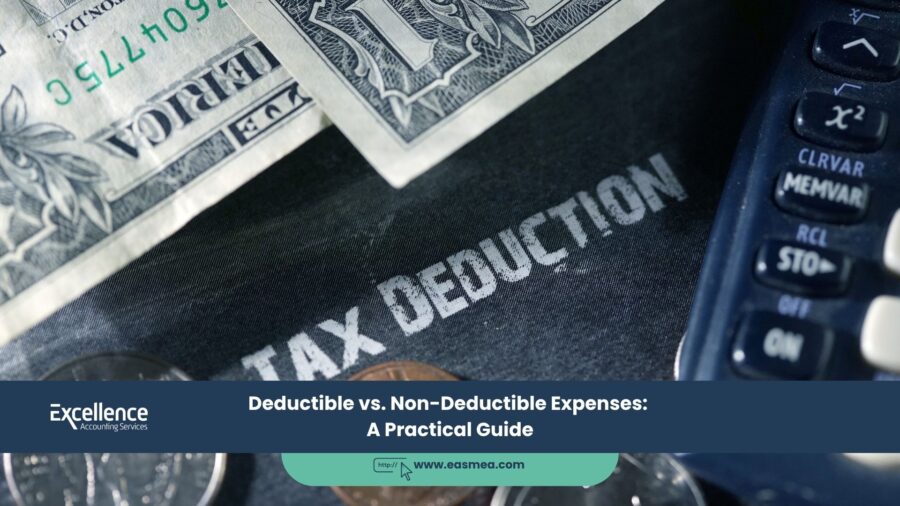Deductible vs. Non-Deductible Expenses: A Practical Guide for UAE Businesses
With the implementation of UAE Corporate Tax, the way businesses approach their finances has fundamentally changed. No longer is accounting just about tracking profit and loss; it’s now a critical component of your tax strategy. The single most important concept in this new era is understanding which of your business expenses can be deducted from your revenue to arrive at your taxable income. This is where your tax liability is won or lost.
- Deductible vs. Non-Deductible Expenses: A Practical Guide for UAE Businesses
- The Golden Rule: The "Wholly and Exclusively" Principle
- A Closer Look at Deductible Expenses
- Navigating Non-Deductible Expenses
- Optimize Your Tax Position with Excellence Accounting Services (EAS)
- Frequently Asked Questions (FAQs)
- Are You Maximizing Your Deductions?
Simply put, a “deductible” expense is a cost that the Federal Tax Authority (FTA) allows you to subtract from your total income, thereby reducing the amount of profit subject to the 9% Corporate Tax rate. A “non-deductible” expense is a cost that you cannot subtract, meaning you pay tax on the profit as if that expense never happened. The distinction is crucial, and misclassifying expenses can lead to overpaying your taxes or, worse, facing penalties for incorrect filings.
This guide will provide a clear and practical breakdown of deductible and non-deductible expenses under the UAE Corporate Tax law. We will explore the core principles that govern deductibility, walk through specific examples of what you can and cannot claim, and highlight the importance of meticulous record-keeping to substantiate your claims.
Key Takeaways
- The “Wholly and Exclusively” Rule: The foundational principle is that an expense must be incurred entirely for the purpose of your business to be deductible.
- Deductible Expenses Reduce Taxable Income: Costs like salaries, rent, marketing, and 50% of entertainment expenses can be subtracted from your revenue, lowering your tax bill.
- Non-Deductible Expenses Offer No Tax Relief: Costs like government fines, most donations, and capital asset purchases cannot be immediately deducted.
- Capital vs. Revenue Expenditure: The cost of buying a long-term asset (capital) is not immediately deductible, but its depreciation over time is.
- Impeccable Records are Non-Negotiable: You must maintain invoices and proof of payment for every expense you claim to justify your deductions to the FTA. Professional bookkeeping is essential.
The Golden Rule: The “Wholly and Exclusively” Principle
Before we dive into specific categories, it’s vital to understand the foundational principle that the FTA uses to determine deductibility. An expense is generally deductible if it was incurred “wholly and exclusively” for the purposes of generating the taxpayer’s taxable income.
This means the primary motivation for the expense must be for business. If an expense has a dual purpose (partly business, partly personal), only the business portion can be deducted, and you must be able to prove how you apportioned it.
- Clear-cut Example: The rent for your office in Downtown Dubai is 100% deductible. It is wholly and exclusively for your business.
- Dual-Use Example: Using your personal mobile phone for business calls. You can only deduct the portion of the bill that relates to business use, and you need call logs to prove it.
Think of every expense through this lens: “Can I prove to the FTA that this cost was necessary for me to run my business and earn income?” If the answer is a clear “yes,” it’s likely deductible.
A Closer Look at Deductible Expenses
Here are some of the most common categories of business expenses that are generally fully or partially deductible under UAE Corporate Tax law.
Salaries, Wages, and Employee Benefits
All costs related to your employees are typically deductible. This includes:
- Basic salaries and wages.
- Bonuses and overtime pay.
- End-of-service gratuity and pension contributions.
- Costs of employee visas and health insurance.
This is a core operational cost and is fundamental to the “wholly and exclusively” rule.
Rent, Utilities, and Office Expenses
The costs of maintaining your physical place of business are deductible.
- Rent for your office, warehouse, or retail space.
- Utility bills such as DEWA, district cooling, and internet.
- Office supplies, stationery, and other consumables.
Professional and Legal Fees
Fees paid for external professional services are deductible as they support your business operations and compliance.
- Fees paid to your auditors and accountants.
- Legal fees for contract drafting or business advice.
- Consultancy fees, including for strategic financial advice or marketing.
Marketing and Advertising Costs
All expenses incurred to promote your business and attract customers are deductible. This includes costs for digital marketing campaigns, social media advertising, print ads, and event sponsorships.
Interest Expenses on Loans
Interest paid on a loan taken out for business purposes is deductible, but with important limitations. The UAE has introduced a general interest limitation rule where the net interest expense deduction is capped at 30% of the business’s EBITDA (Earnings Before Interest, Tax, Depreciation, and Amortization). This is a complex area requiring professional calculation.
Entertainment Expenses (Partially Deductible)
This is a key area of partial deduction. You can deduct 50% of the costs incurred for entertaining customers, suppliers, or employees. This includes:
- Business lunches and dinners with clients.
- Staff parties, Iftar gatherings, or team-building events.
For example, if you spend AED 1,000 on a client dinner, you can only deduct AED 500 from your taxable income.
Navigating Non-Deductible Expenses
Just as important as knowing what you can deduct is knowing what you cannot. Claiming a non-deductible expense can lead to an incorrect tax filing and potential penalties.
Capital Expenditures
This is the most fundamental distinction. You cannot immediately deduct the full cost of purchasing a long-term asset (an item that will benefit your business for more than one year).
- Example: You buy a new delivery vehicle for AED 100,000. You cannot deduct this AED 100,000 in the year of purchase.
- The Solution (Depreciation): Instead, you “capitalize” the asset and deduct its cost over its useful life through depreciation. If the vehicle has a useful life of 5 years, you can deduct AED 20,000 each year as a depreciation expense.
Fines and Penalties
Any fines or penalties levied by a government body are not deductible. This includes traffic fines, penalties from the FTA for late VAT filing, or penalties from the Ministry of Human Resources and Emiratisation.
Donations and Grants
Donations are only deductible if they are made to a “Qualifying Public Benefit Entity” that is listed in a Cabinet Decision. Donations to any other charity or non-profit, no matter how worthy, are not deductible for Corporate Tax purposes.
Recoverable VAT
When you incur an expense that includes VAT, you can typically recover that VAT through your VAT return. Since you get the money back, the VAT portion of the cost is not considered an expense for Corporate Tax purposes and is therefore not deductible.
| Expense Category | Deductible Status | Key Consideration |
|---|---|---|
| Employee Salaries | ✔ Deductible | Must be for business purposes and at market rates. |
| Client Entertainment | ✔ 50% Deductible | Only half the cost can be claimed. Records must be kept. |
| Purchase of New Machinery | ✖ Not Immediately Deductible | This is a capital expense. Its cost is deducted over time via depreciation. |
| Government Fines | ✖ Non-Deductible | Penalties for breaking the law cannot be used to reduce your tax. |
| Donation to an Unapproved Charity | ✖ Non-Deductible | Must be a Qualifying Public Benefit Entity to be deductible. |
| Office Rent | ✔ Deductible | A clear business expense, wholly and exclusively for business. |
Optimize Your Tax Position with Excellence Accounting Services (EAS)
Correctly classifying your expenses is the foundation of an effective tax strategy. The experts at EAS can help you navigate the complexities of the UAE Corporate Tax law to ensure you are fully compliant and tax-efficient.
Our Corporate Tax Services Include:
- Corporate Tax Advisory: We provide strategic advice on structuring your transactions and classifying your expenses to legally minimize your tax liability.
- Meticulous Bookkeeping: Our team will maintain your financial records with precision, ensuring every expense is correctly categorized and documented, ready for FTA scrutiny.
- Tax Return Filing: We can prepare and file your annual Corporate Tax return, ensuring all deductions are correctly claimed and calculated.
Frequently Asked Questions (FAQs)
Yes. Depreciation is the mechanism through which the cost of a capital asset is deducted over its useful life. While the initial purchase is not deductible, the annual depreciation charge is a deductible expense.
Yes, these are known as “pre-commencement” expenses and can be deducted under certain conditions. They must be related to the business that you eventually started. The rules around this can be specific, so professional advice is recommended.
You must apportion the expense and can only deduct the business portion. For example, if you determine that 70% of your phone usage is for business, you can deduct 70% of the bill. You must have a reasonable basis for this apportionment and maintain records (like call logs) to prove it to the FTA.
Provisions (estimates of future bad debts) are generally not deductible. However, you can deduct a specific bad debt expense at the point it is actually written off, provided you have taken reasonable steps to collect the debt.
Yes. If the travel is wholly and exclusively for business purposes, the cost of travel, accommodation, and meals is generally deductible. The class of travel is not typically restricted, as long as the primary purpose is business.
Payments to “Related Parties” (like family members or connected companies) are deductible only if they meet the “arm’s length principle.” This means the payment must be consistent with what would be paid to an unrelated third party for the same service. Inflated salaries to family members would likely be disallowed.
Yes, these are generally considered deductible business expenses in the period they are incurred.
You must keep a valid tax invoice for every expense you claim. In addition, you should have proof of payment (like a bank transaction record) and any supporting documents (like contracts or agreements) that demonstrate the business purpose of the expense. Meticulous record-keeping is your best defense in a tax audit.
Similar to payments to related parties, interest paid on a loan from a shareholder is deductible only if the interest rate is at an “arm’s length” rate—meaning it’s comparable to what a bank would charge. It would also be subject to the general interest limitation rules.
The biggest mistake is poor record-keeping. Many businesses incur legitimate deductible expenses but fail to keep the proper invoices and documentation. Without proof, the FTA can disallow the deduction, leading to a higher tax bill and potential penalties. The second biggest mistake is incorrectly claiming non-deductible items like fines or the full cost of entertainment.
Conclusion: The Foundation of Tax Compliance
Understanding the distinction between deductible and non-deductible expenses is fundamental to managing your UAE Corporate Tax obligations effectively. It requires a shift in mindset, where every cost is evaluated for its business purpose and documented meticulously. By embracing this discipline, you not only ensure compliance but also empower your business to operate in the most tax-efficient manner possible.
Given the nuances of the law, particularly around areas like interest and entertainment, seeking professional guidance is not a luxury—it’s a prudent business decision that can save you money and protect you from risk.
Are You Maximizing Your Deductions?
Our expert tax advisors can review your expenses and provide a clear strategy for tax optimization and compliance.




